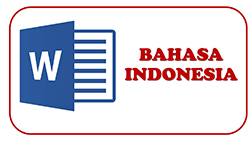Efektivitas Pembelajaran Makhârij Al-Hurf Secara Virtual (Studi Kasus Terhadap Komunitas Whatsapp Tahfizh)
Abstract
The development of technology affects various sectors, one of which is the education sector. Based on these technology advances, there is a Whatsapp Tahfizh (WAFI) community that accommodates anyone who want to learn the Qur'an but has limited time because of busyness. The learning system in WAFI is virtual based, so it can be followed by a wide range of people both ages and professions. One of the tahsin classes provided by WAFI is makhârij al-hurf class. Using the concept of virtual learning, this is certainly an option for those who want to learn the Qur'an but have a little time. Because during the learning process each participant can deposit at any time the reading on the condition that they meet the target on that day. Especially with the covid 19 pandemic, the learning of the Qur'an in WAFI provides a good news in the treasures of learning the Qur'an. The purpose of this study is to measure the effectiveness of learning makhârij al-hurf virtual hammering hosted by WAFI. The research method used is qualitative with a case study approach. Respondents taken were correctors as well as management in the WAFI community, active participants in the class makhârij al-hurf also based on data and experiences collected by the author who is one of the correctors in the class makhârij al-hurf. The results of the study conducted that learning makhârij al-hurf virtually have a positive impact although not as much as face to face learning (directly). However, WAFI remains a solution for anyone who wants to learn the Qur'an and has limited time due to busyness.
Downloads
References
Al Halim, A. A., & ‘Azizah, W. N. (2018). Upaya Peningkatan Kemampuan Membaca Al-Qur’an melalui Pengenalan Hiuruf Hijaiyah Menggunakan Metode Qo’idah Baghdadiyah ma’a Juz’ama (Turutan) di Kelas 1A MI Ma’arif NU 01 Tritihkulon Tahun Pelajaran 2015/2016. Jurnal Tawadhu, 02(01).
Fadli, I. N., & Ishaq, U. M. (2019). Aplikasi Pengenalan Huruf dan Makharijul Huruf Hijaiyah Dengan Augmented Reality Berbasis Android. Komputika : Jurnal Sistem Komputer, 8(2), 73–79. https://doi.org/10.34010/komputika.v8i2.2186
Fathoni, A. (2017). Petunjuk Praktis Tahsin Tartil Al-Qur’an METODE MAISURA. Yayasan Bengkel Metode Maisura.
Hasanah, N., & Hamdan, A. M. (2021). Dampak Pandemi Covid-19 terhadap Proses Pembelajaran di Taman Pendidikan Al-Qur’an (TPQ). Jurnal Riset dan Pengabdian Masyarakat, 01(01), 19.
Hasanah, U., Setia, S. D., Fatonah, I., & Deiniatur, M. (2020). PENINGKATAN KEMAMPUAN MEMBACA AL QUR’AN MELALUI PENGENALAN MAKHORIJUL HURUF PADA ANAK MENGGUNAKAN METODE SOROGAN. Al-Din: Jurnal Dakwah dan Sosial Keagamaan, 6(2). https://doi.org/10.35673/ajdsk.v6i2.1133
Rusadi, B. E. (2020). Tahfiz Online: Sarana Menghafal Alquran Secara Online. Intiqad: Jurnal Agama Dan Pendidikan Islam, 12(01).
Sudiarjo, A., Mariana, A. R., & Nurhidayat, W. (2015). Aplikasi Pembelajaran Ilmu Tajwid, Waqaf dan Makharijul Huruf Berbasis Android. 7.
Tsuroya, F. I. (2021). Dampak Pembelajaran Online di Tengah Pandemi Covid-19 Terhadap Proses Pembelajaran Metode Yanbu’a di Kelas 2 MI At-Taqwa Bondowoso. IQ (Ilmu Al-qur’an): Jurnal Pendidikan Islam, 3(02), 199–214. https://doi.org/10.37542/iq.v3i02.124
Wahyuningsih, S. (2013). METODE PENELITIAN STUDI KASUS (Konsep, Teori Pendekatan Psikologi Komunikasi, Dan Contoh Penelitiannya. UTM Press.
Zuama, S. N., & Mursanib, M. (n.d.). PENGARUH KEBIASAAN YANG EFEKTIF TERHADAP KEMAMPUAN MENGELOLA WAKTU PRIBADI PADA MAHASISWA. Program Studi PG PAUD FKIP Universitas Tadulako.





.png)










